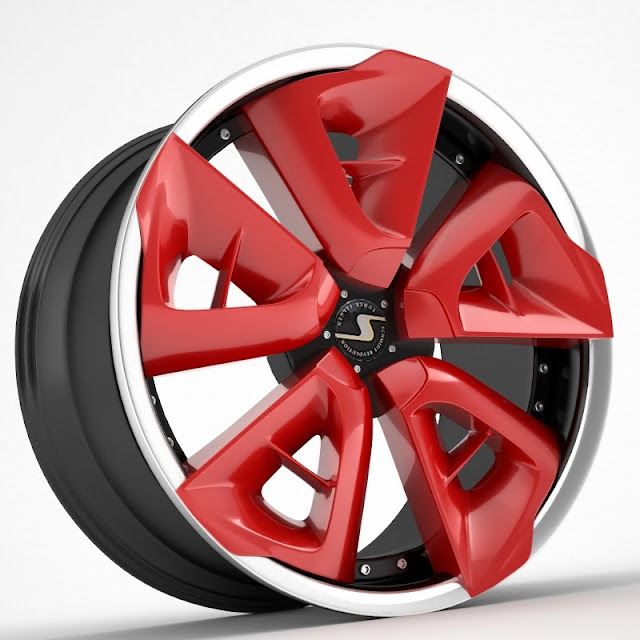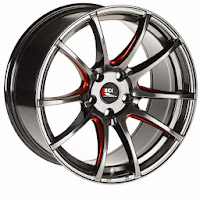The alloy used in the finest road wheels today is a blend of aluminum and other elements. The term "mag wheel" is sometimes incorrectly used to describe alloy wheels. Magnesium is generally considered to be an unsuitable alloy for road usage due to its brittle nature and susceptibility to corrosion. (Flammability doesn't help either!)..
DIFFERENCE BETWEEN ALLOY WHEEL & STEEL WHEEL
The reason alloy wheels are preferable, is because usually they're much lighter. An aluminium or magnesium alloy wheel will have your car shed more than a few kilograms of weight. Not only that, but its rotational inertia I=mr² will also decrease. Every kilogram you shed from the wheels will count almost double towards your acceleration.. Getting rid of 10kg of weight from your wheels is about the same as removing 17-20kg from your trunk in terms of acceleration..
An even greater benefit is the decrease in unsprung weight. By decreasing the inertia of your wheels, your suspension will be even more proficient at keeping your wheels firmly planted to the ground on slightly bumpy tarmac..
And yes, they can be pretty, shiny and whatnot.
Alloy Wheels :
►Enhance the look of your vehicle
►Are manufactured to precise standards to meet exact fitment and performance needs
►Weigh less than steel wheels and have superior strength
►May be the preferred option for your vehicle based on fitment requirements
►Will allow for better brake clearance (depending on wheel style and brake components installed)
►Require proper maintenance as finish damage may result in the harshest winter climates where salt and sand are routinely used
Steel Wheels :
►Meet the basic needs of drivers who want the convenience of a winter tire .package without the additional cost of an alloy wheel
►Typically available in black or silver finish depending on the application
►Basic styling can often be updated with wheel covers
►Cost less than alloy wheels due to ease of manufacturing and lower material costs
HOW TO CLEAN ALLOY WHEELS
2. Rub the wheels with a wet sponge. Starting the process this way will remove most of the remaining brake dust and dirt, preventing you from scratching the wheels when you scrub the surface.
3. Remove dirt and debris from alloy wheels with a store bought cleaner. Avoid acid based cleaners because they tear the lacquer off the wheel.
Mix the proper amounts of water and cleaner in a bucket. Read the instructions on the product to find out the correct ratio of water and alloy wheel cleaning solution.
Soak a sponge in the bucket of cleaner and water. Squeeze the sponge over the bucket to avoid wasting the cleaner.
Scrub the wheels with the sponge. Because you already rinsed and lightly rubbed off much of the dirt, hard scrubbing should not damage the alloy wheels.
Use an old toothbrush to clean the crevices in the wheels.
4. Rinse off the solution. Spray the wheels with a hose to remove the cleaner solution.
5. Dry the wheels with a microfiber cloth or chamois.
6. Remove stubborn stains from alloy wheels with household items.
Use aluminum foil and cola to remove rust. Sand the wheels with a piece of aluminum foil soaked in cola.
Clean grease from alloy wheels with vinegar. Use either cider or white vinegar, as both remove grease.Apply lemon juice to the wheels to make them shine. Let the lemon juice sit on the wheels for 10 minutes, and rinse it off with water.
7. Add wheel wax to protect the alloy surface. Use a wax made especially for alloy wheels, and apply it at least every 3 months.
BENEFITS OF ALLOY WHEELS
The most obvious benefit of an alloy wheel over a steel wheel is that they are lighter. Wheels are a part of your vehicle that is classified as unsprung weight. Unsprung weight is any portion of the vehicle that isn't supported by the suspension, and is most susceptible to cornering forces and shock transmission. Anything you can do to decrease the unsprung weight will improve your car's cornering characteristics, increase the precision of your steering input and decrease road feedback..
Even though alloy wheels are lighter than steel alternatives, they are also stronger. The stronger materials can reduce tire deflection in hard cornering, which is critical in cars that have high performance tires, and during evasive maneuvering where gravitational forces are multiplied..
Almost all of the physical properties of quality alloy wheels are preferable to steel wheels. Since the product is superior in almost every way, the high prices are justified. It has also increased the use of alloy rims as standard fare in the auto industry. All high performance vehicles and high end models come with alloy rims standard..
Besides the constant contact with the road and their location below the suspension, wheels are also subject to constant spinning. Your car has to start the weight of the wheels spinning every time you accelerate, and stop that weight every time you break. The lighter rotational weight of alloy wheels can give you a slight increase in acceleration, and since it takes slightly less power to get up to the same speed, better overall fuel economy. This effect will be greatest during city driving where you are subject to more full stops..
The other benefit of the alloy material is their heat conductivity. The metals help dissipate heat from your breaks, which can increase their practical service life, their effectiveness, and also reduces the likelihood oh break fade during hard breaking..
The quality of standard auto parts such as wheels, break-pads, and tires has increased significantly in the last two decades. Even though your current wheels are probably suitable for everyday driving, alloy wheels will still offer plenty of benefits. If you plan on going to alloy wheels, you will want to keep your overall diameter the same. A larger rim with a lower profile tire is optimum, and can increase performance as well as appearance. Whether or not the price of an upgrade to alloy rims is justified is highly dependent on your normal driving habits, and the conditions you drive in daily..
ALLOY WHEELS GALLERY
By : Automotive News & Super Modified Sports Cars





















Great blog.. you have shared all the information at one place, I really like reading this post as it have so many of information. Thank you so much for sharing this blog. It helped a lot. its really worth sharing. tubeless road wheels
ReplyDelete